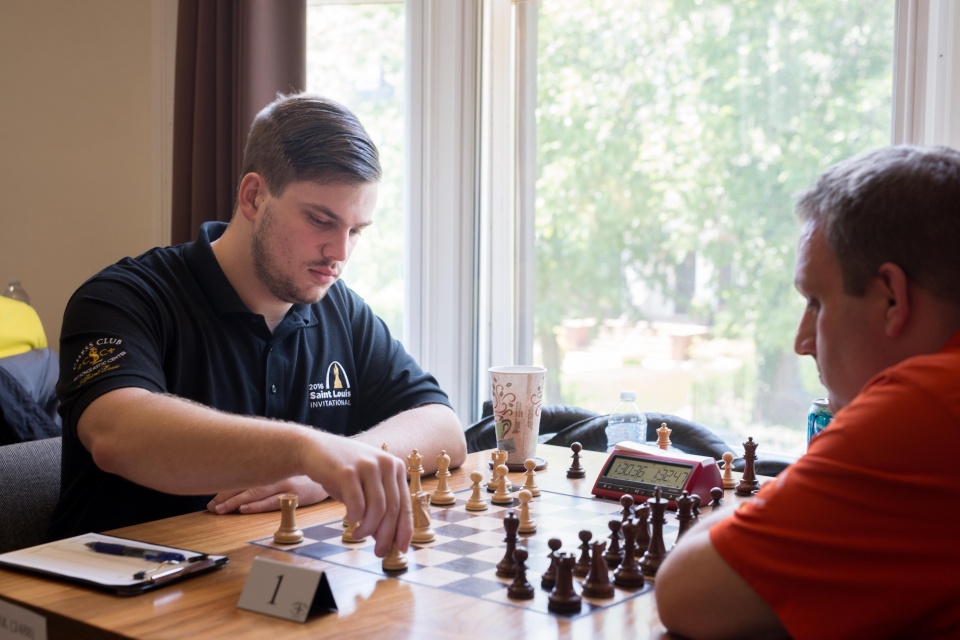 IM Steven Zierk, Photo Austin Fuller
IM Steven Zierk, Photo Austin Fuller Grandmaster hopefuls IM Steven Zierk and IM Akshat Chandra tied for first at the 2016 Saint Louis Invitational, scoring 5.5/9 against a very tough field in the GM-norm section. Although both fell short of earning their third and final norm (6.5/9 was needed) their “+2” performance will net them a few rating points and $1000 each in prize money. Tying for third place were Webster University teammates GM Ashwin Jayaram and IM Irine Sukandar, each with 5/9. In the IM-norm section, IM Angelo Young took an early lead and never looked back to score 6/9 and take clear first place, followed by FM Gauri Shankar and yours truly sharing 2nd-3rd with 5.5/9. While there were no norms achieved in either event, the tournament was filled with exciting games and many decisive results throughout the week. Norms are often difficult to achieve in round robins, where every player in the field is capable of beating anyone else--in the past the annually held invitational has produced both GM and IM norms for players looking to complete their titles. Most notably in 2014: Sam Sevian surged to a 4/4 start and crossed the 2500 rating threshold to become the youngest American Grandmaster in history.
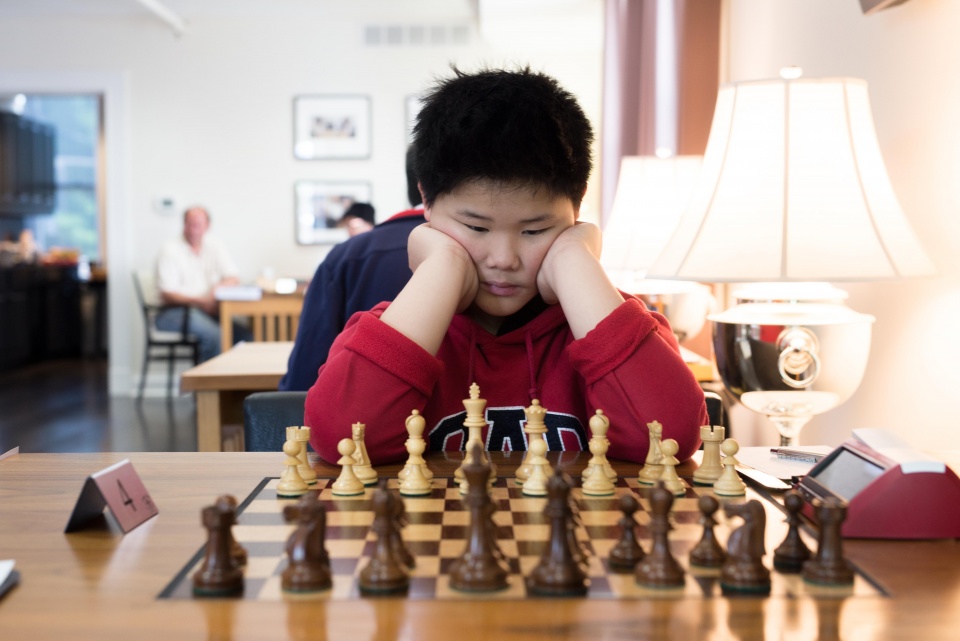 Awonder Liang, Photo Austin Fuller
Awonder Liang, Photo Austin FullerAlso included in the GM group was 15-year-old IM Ruifeng Li, whose FIDE rating has already passed 2500, as well as the even younger IM Awonder Liang, fresh off his breakthrough performance at the recently concluded Continental Championships, where Awonder earned his first GM norm. Rounding out the field was GM Ben Finegold, GM Denes Boros, IM Aman Hambleton of Canada, and IM Eric Rosen.
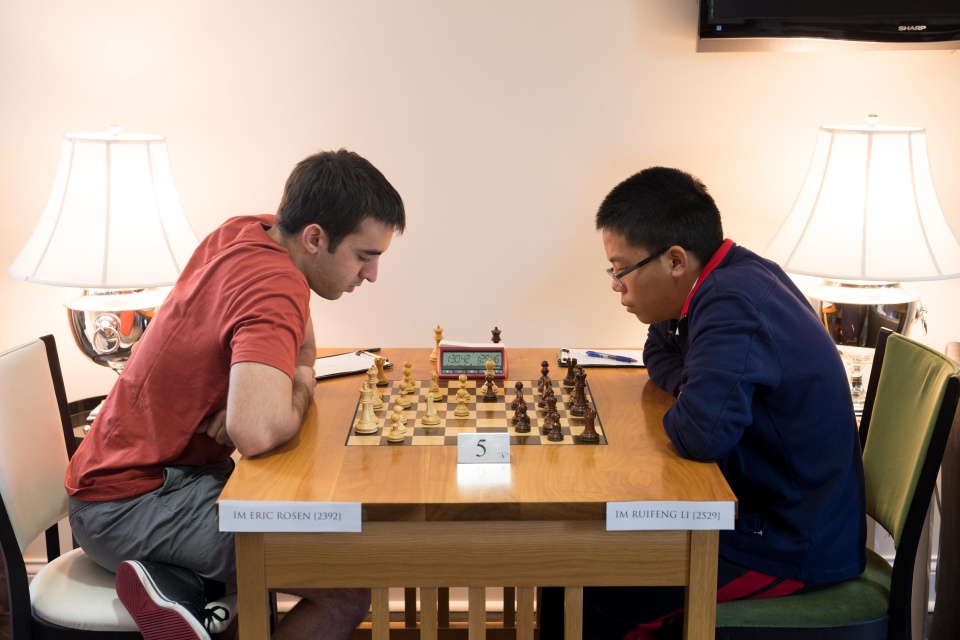 IM Eric Rosen vs. Ruifeng Li, Photo Austin Fuller
IM Eric Rosen vs. Ruifeng Li, Photo Austin FullerThe IM section had a few familiar players and also a couple of newcomers. Along with the top prizewinners, IM Michael Brooks, FM Doug Eckert, and FM Seth Homa have all played in the invitational before. The new faces included IM Jaroslav Bures of the Czech Republic, FM Lefong Hua of Canada, and two of the U.S.’s rising stars: FM Hans Niemann and NM Carissa Yip, the latter having just played in her first U.S. Women’s Championship earlier this year.
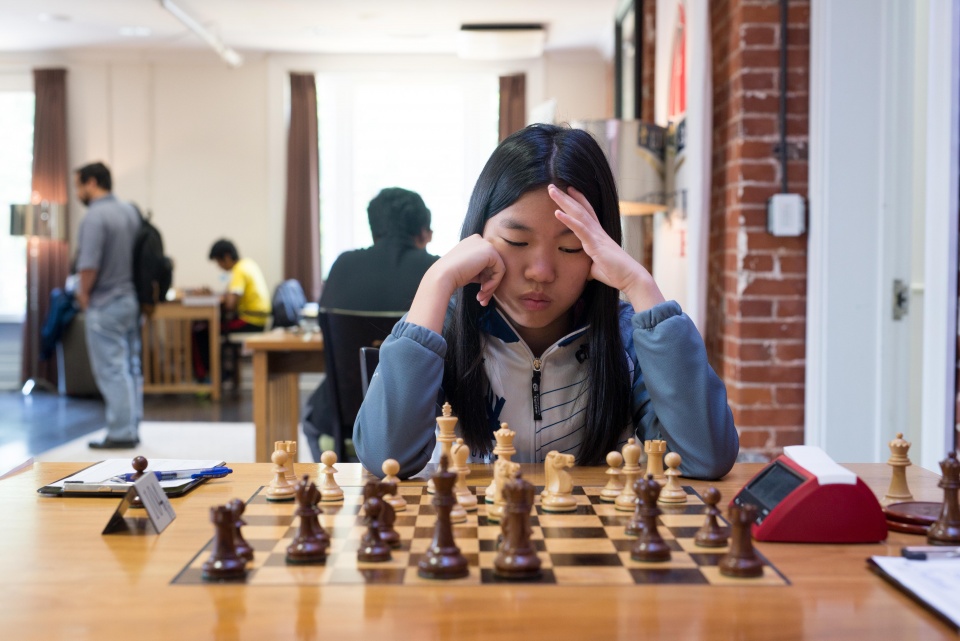 Carissa Yip, Photo Austin Fuller
Carissa Yip, Photo Austin Fuller Zierk, who won the U18 World Championship in 2010, was the closest to achieving a GM norm, needing 2/3 from the final three rounds. Here is one of Steven’s four wins in the event, this one coming at the expense of Hambleton, annotated by both Steven along with GM Elshan Moradiabadi, guest annotating with his view of the sharp encounter:
[pgn] [Event "2016 Saint Louis GM Norm Invitational"] [Site "Earth"] [Date "2016.06.11"] [White "Zierk, Steven"] [Black "Hambleton, Aman"] [Result "1-0"] [ECO "C16"] [WhiteElo "2488"] [BlackElo "2442"] [Annotator "Zierk, Steven- Moradiabadi, Elshan"] [PlyCount "79"] [EventDate "2016.??.??"] 1. e4 e6 2. d4 d5 3. Nc3 Bb4 4. e5 Ne7 5. Bd2 {Elshan: An odd choice. Most of the top rated players would go for a3 expecting Bxc3, bxc3 and c5. I guess Steven did not like the following continuation.} (5. a3 Bxc3+ 6. bxc3 b6 { Elshan: Or Black may not have had any intention to enter the main line of Winawer at all!}) 5... b6 {Passive and static. Recent theory has nothing in favor of White after 5...c5.} (5... c5 6. a3 Bxc3 7. Bxc3 b6 8. Bb5+ Bd7 9. Bd3 Nbc6 {Elshan: And as we can see, although White has managed to keep his pawn structure intact, because of the two precious tempi used by his dark-squared bishop (Bd2, Bxc3), he does not manage to build the dream pawn chain c3-d4-e5. As GM Vallejo Pons shows in this game, White's advantage evaporates very quickly!} 10. f4 c4 $5 (10... cxd4 11. Bd2 O-O {and f6 is fine too}) 11. Be2 Nf5 12. g3 b5 13. b4 a5 14. bxa5 Rxa5 $5 15. Qd2 (15. Bxa5 Qxa5+ 16. Kf2 Ncxd4 $40 {with a devastating attack for Black.}) 15... Ra4 16. Nf3 O-O 17. O-O Qb6 18. g4 Nfe7 19. Bb2 f5 20. exf6 Rxf6 21. Ne5 Be8 $11 {Bartel-Vallejo Pons, Bundesliga 2016.}) 6. f4 Bxc3 7. Bxc3 Ba6 8. Bxa6 Nxa6 9. Nf3 c5 10. Qe2 Nb8 11. Bd2 cxd4 12. Nxd4 Nbc6 13. Nf3 Nf5 14. O-O-O h5 {An even middlegame. I wasn’t thrilled by my dark squared bishop, but White has a clear plan of g4 and f5, after which the bishop could become very strong. Elshan: I agree with this assessment.} 15. g3 Qe7 16. Qg2 Qc5 17. Kb1 a5 18. h3 h4 $2 {Elshan: This move really surprised me! It is not losing and at most it is dubious. However, the idea of playing on White's side (as we mentioned earlier, White is planning to play g4 and f5), seems very strange to me.This move does not turn the tables but it tells me that Aman started losing the thread at this point.} 19. g4 Ng3 20. Rhe1 Nb4 21. Rc1 (21. Bc1 Rc8 22. c3 Nc6 23. f5 {Elshan: seems more convincing to me.}) 21... Ne4 22. Ng5 $6 {A risky decision, since endgames will be quite bad for White with his weak pawns. But White gets good play against f7 and h4. Elshan: This may let things get out of hand very fast. The h4-pawn is not really an important target since Black's attack is going to be much faster on the queenside. If I were White I would have gone for Qe2 and Be3.} Nxg5 23. fxg5 O-O 24. Qf3 d4 {I did not like this move, since it gives White e4 without accomplishing much, but if followed up correctly it is fine. Elshan: 24...d4 is a waste of time. Black has to push his pawns on the queenside or develop one of his rooks.} 25. Qe4 Nd5 $6 {Elshan: Way too optimistic. I think 25...g6 was necessary.} 26. g6 Rac8 27. g5 ({Perhaps I should have chosen} 27. Rf1 {instead since} Nc3+ {no longer forces a draw, but leads to sharp play after} 28. Bxc3 dxc3 29. gxf7+ Rxf7 30. Rxf7 Kxf7 31. Qh7 $14 {Elshan: agreed!}) 27... fxg6 $2 {This makes Black’s previous moves a waste of time.} ({He had to continue with} 27... Nc3+ $1 {and after} 28. Bxc3 { the complications peter out to a draw:} (28. bxc3 dxc3 {leads to the same thing as White is forced to take on c3 a second time} 29. Bxc3 Qxc3 30. gxf7+ Rxf7 31. g6 Rf2 $11) 28... dxc3 29. gxf7+ Rxf7 30. g6 Rf2 31. bxc3 Qxc3 32. Qxh4 Rc4 33. Qh7+ Kf8 34. Qh8+ Ke7 35. Qxg7+ $11 {with a perpetual.}) 28. Qxg6 {Now Nc3+ is no longer a fork and White is not forced to capture the knight.} Qc6 29. Qh5 {Elshan: Steven exploited the f7 weakness. Now we see why the pawn on h4 is so bad: not only it is weak and under attack, but also it left g6 and f7 weak behind.} Rf5 30. Qxh4 Nc3+ {Perhaps this is what Black had in mind all along, but White has a counterblow. Elshan: Desparation!} 31. Ka1 Qd5 32. bxc3 dxc3 33. Be3 Rc4 34. Qh5 $1 {The key and only winning move -- Qe8+ prevents Ra4.} Qc6 35. Red1 {Defending with Rb1-b3 would also win, but this is faster.} Ra4 36. Rd8+ Rf8 37. Rxf8+ Kxf8 38. Rf1+ Kg8 39. Qf7+ Kh8 40. Qf8+ { Elshan: This was a victory for consistency in plan. White did not make any brilliant move, yet all of his moves were purposeful and followed his long-term strategy. On the other hand, Black's dynamic play lacked consistency in plan and he lost the thread between moves 20-30.} (40. Qf8+ Kh7 41. g6+ Kxg6 42. Rg1+ {leads to mate in a few.}) 1-0[/pgn]
Steven then lost to Sukandar in Round 7 and his norm hopes vanished the following round to Ruifeng, after he blundered a piece not long out of the opening. [pgn] [Event "St Louis Inv GM 2016"] [Site "Saint Louis USA"] [Date "2016.06.11"] [White "Sukandar, I."] [Black "Zierk, S."] [Result "1-0"] [ECO "C01"] [WhiteElo "2401"] [BlackElo "2488"] [PlyCount "71"] [EventDate "2016.06.08"] [EventType "tourn"] [EventRounds "9"] [EventCountry "USA"] [EventCategory "9"] 1. e4 e6 2. d4 d5 3. exd5 exd5 4. Nf3 Bd6 5. Bd3 Ne7 6. O-O Bg4 7. Bg5 Nbc6 8. c3 Qd7 9. Nbd2 O-O-O 10. b4 f6 11. Bh4 Nf5 12. Qc2 Nce7 13. Bg3 Nxg3 14. fxg3 h5 15. Rae1 g5 16. Ne5 fxe5 17. dxe5 Nc6 18. exd6 Qxd6 19. Bf5+ Kb8 20. Re6 Qd7 21. Nb3 d4 22. b5 Ne7 23. Bxg4 d3 24. Qf2 hxg4 25. Nc5 Qe8 26. Qf6 d2 27. Rd1 Rh7 28. Qxg5 b6 29. Na6+ Kb7 30. Qe5 Qd7 31. Qe4+ Qd5 32. Rxe7 Rxe7 33. Qxe7 Rd7 34. Qe2 c5 35. Qe8 Rd8 36. Rxd2 1-0[/pgn]Meanwhile Akshat had an extremely steady tournament, finishing with two wins and seven draws—here is his win over Ruifeng in Round 3:
[pgn] [Event "St Louis Inv GM 2016"] [Site "Saint Louis USA"] [Date "2016.06.09"] [White "Chandra, Akshat"] [Black "Li, Ruifeng"] [Result "1-0"] [ECO "A80"] [WhiteElo "2464"] [BlackElo "2529"] [PlyCount "69"] [EventDate "2016.06.08"] [EventType "tourn"] [EventRounds "9"] [EventCountry "USA"] [EventCategory "9"] 1. d4 f5 2. Nc3 d5 3. Bf4 a6 4. e3 Nf6 5. Nf3 e6 6. Bd3 c5 7. dxc5 Bxc5 8. O-O Nc6 9. Ne2 O-O 10. c4 Nb4 11. a3 Nxd3 12. Qxd3 Bd7 13. Ne5 Be8 14. Nd4 Qe7 15. Rfc1 Rd8 16. b4 dxc4 17. Qxc4 Bxd4 18. exd4 Nd5 19. Bd2 Bb5 20. Qb3 Be8 21. a4 Bh5 22. Qh3 Be8 23. Qb3 Nf6 24. b5 Rxd4 25. Nf3 Rxd2 26. Nxd2 axb5 27. axb5 Kh8 28. Ra8 e5 29. b6 e4 30. Rc7 Qe5 31. Qg3 Qxg3 32. hxg3 Kg8 33. Rxb7 Nd5 34. Rbb8 Kf7 35. b7 1-0[/pgn]
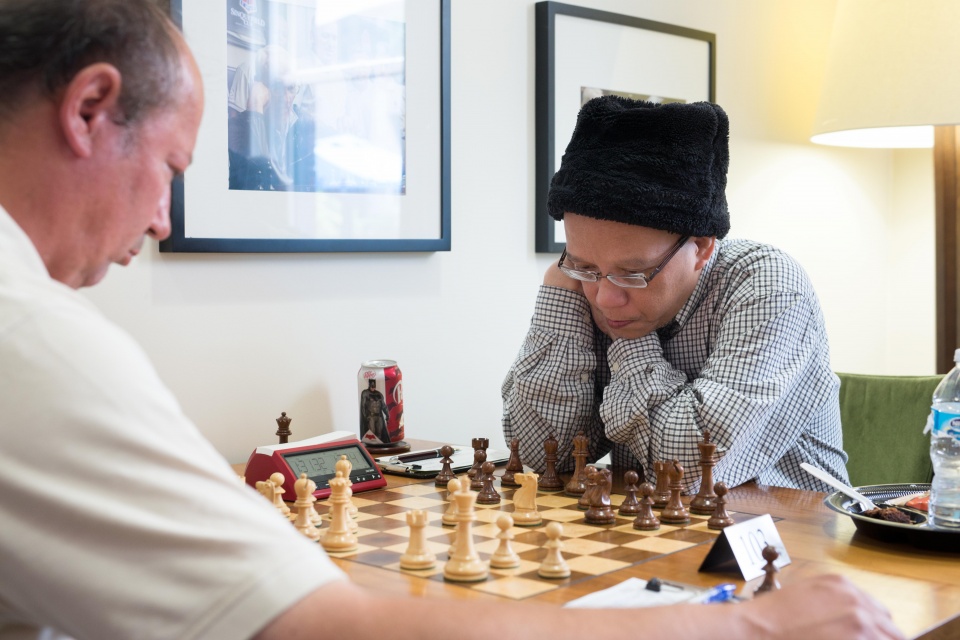 IM Angelo Young, Photo Austin Fuller
IM Angelo Young, Photo Austin Fuller While the standings in the GM section were tight throughout the event, IM Angelo Young led the IM group the whole way, finishing in clear first despite a last round loss (!). Known for his swashbuckling style of chess, here is one of Angelo’s more exciting victories, against Homa:
[pgn] [Event "St Louis Inv IM 2016"] [Site "Saint Louis USA"] [Date "2016.06.10"] [White "Young, An"] [Black "Homa, S."] [Result "1-0"] [ECO "D02"] [WhiteElo "2300"] [BlackElo "2316"] [PlyCount "161"] [EventDate "2016.06.08"] [EventType "tourn"] [EventRounds "9"] [EventCountry "USA"] [EventCategory "3"] 1. d4 d5 2. Nf3 Nf6 3. c3 e6 4. Bg5 Nbd7 5. Nbd2 h6 6. Bf4 Be7 7. h3 c5 8. e3 O-O 9. Bd3 b6 10. g4 Bb7 11. g5 Ne4 12. gxh6 g5 13. Rg1 Kh8 14. Bh2 c4 15. Bc2 b5 16. h4 Rg8 17. hxg5 Bxg5 18. Nxe4 dxe4 19. Nxg5 Rxg5 20. Kd2 Qf6 21. Rxg5 Qxg5 22. Qh1 Qf5 23. Bf4 e5 24. dxe5 Nxe5 25. Bxe5+ Qxe5 26. Rg1 Rg8 27. Rxg8+ Kxg8 28. Qh4 Kh7 29. f3 f6 30. Qf4 Qd5+ 31. Ke1 f5 32. Qg5 Qd7 33. Qf6 a5 34. a3 Bd5 35. Kf2 Ba8 36. Qg7+ Qxg7 37. hxg7 exf3 38. Bxf5+ Kxg7 39. Bd7 Kf6 40. Bg4 Bc6 41. Bxf3 Be8 42. Kg3 Kf5 43. Bb7 Bd7 44. Bh1 Be8 45. Bg2 Ke5 46. Kg4 Bd7+ 47. Kg5 Be8 48. Bb7 Bf7 49. Bc6 Bg8 50. Kg4 Be6+ 51. Kf3 Bf7 52. Bxb5 Bh5+ 53. Kf2 Bf7 54. Bc6 Bg6 55. Bb7 Bh7 56. Kg3 Be4 57. Ba6 Bd5 58. Kf2 Ke4 59. Ke2 Ke5 60. Bc8 Ke4 61. Bg4 Ke5 62. Bf3 Bf7 63. Bc6 Bg6 64. Kd2 Bf5 65. Be8 Be6 66. Bg6 Kf6 67. Bh7 Ke5 68. Bc2 Bf7 69. Ke2 Bg8 70. Kf3 Be6 71. Bh7 Bd5+ 72. e4 Be6 73. Ke3 Bf7 74. Bf5 Bg8 75. Bd7 Kd6 76. Bc8 Ke5 77. Bb7 Bf7 78. Bd5 Bxd5 79. exd5 Kxd5 80. Kf4 Kc6 81. a4 1-0[/pgn]My own tournament performance was quite volatile in terms of both my play and the result of each game. With five wins, three losses, and one draw, I felt that I just as easily could have scored either 3/9 or 7/9! Almost all of my games were filled with odd mistakes and complete turnarounds. I decided to annotate my lone draw, as the back-and-forth nature of the game was really indicative of my tournament experience as a whole.
 Joining me for commentary is Elshan, who provided some great insights into the struggle:
Joining me for commentary is Elshan, who provided some great insights into the struggle: [pgn] [Event "2016 CCSCSL Invitational"] [Site "?"] [Date "2016.06.10"] [White "Kavutskiy, Kostya"] [Black "Hua, Lefong"] [Result "1/2-1/2"] [ECO "A65"] [WhiteElo "2365"] [BlackElo "2270"] [Annotator "Kavutskiy,Kostya- Moradiabadi, Elshan"] [PlyCount "113"] [EventDate "2016.??.??"] 1. d4 {This game took place in Round 5. With 2/4 so far and needing 6.5/9 for the norm, I saw this game as a must-win, having the White pieces.} Nf6 2. c4 c5 3. d5 e6 4. Nc3 exd5 5. cxd5 d6 6. e4 g6 7. Nge2 {I prepared this line quite deeply, as my opponent had nothing but the Benoni in his repertoire and I am comfortable with the ensuing structures. Elshan: This is a very good approach. Deep opening preparation becomes handy when you are in a must-win situation.} Bg7 8. Ng3 O-O 9. Be2 a6 10. a4 Re8 11. O-O Nbd7 12. f3 h5 13. Bg5 Qc7 14. Qd2 Nh7 15. Bh6 {All this is quite normal for the line, my understanding is that a trade of dark-squared bishops favors White, as Black is left with more weaknesses on the kingside.} Bd4+ 16. Be3 Bg7 {Elshan: This is a very odd move. It is either a great improvement or a mistake to be punished!} 17. Nh1 { My first real think of the game. Often White waits to be prompted with h5-h4 but the knight is going to be useful on f2 regardless, so I decided to start with this move before committing my rooks. It's important to note that Black is threatening to play f7-f5 against almost any move, since exf5 is met with Rxe3 in most cases.} ({Also possible was} 17. Rfc1 f5 18. Rab1 {followed by b2-b4, with a dynamic position.}) (17. Rfd1 h4 18. Nf1 h3 {is bothersome.}) ({ Elshan} 17. Rac1 {is likely met with} Qa5) (17. a5 $5) 17... Rb8 ({I thought} 17... f5 {was the best move.} 18. Nf2 ({In the past I and many before me have blundered} 18. exf5 $4 Rxe3 19. Qxe3 Bd4 $19) 18... Ne5 19. Rfc1 {and Black has good counterplay.}) 18. Nf2 b6 {During the game I felt like this move is too passive, but Black is worried about White fixing the queenside with a4-a5, followed by breaking things open with b2-b4.} ({Now} 18... f5 {can be met with} 19. exf5 (19. Rac1 {is also very possible.}) 19... gxf5 20. Rfe1 Ne5 21. Nh3 $1 {and with the knight coming to f4 I like White.}) 19. Rfc1 {Hinting at b2-b4. I started to feel very optimistic here, especially as I was accumulating a large time advantage (about 75 minutes vs. 30-40).} Qd8 20. Rab1 a5 {While Lefong stops my main idea of b2-b4, I felt like this was a major concession, as the b5 square can now be used by White's bishop or knight (with idea Nb5-a7-c6). Elshan: I do not like this a5 at all! Black just kills his counterplay, gives away the b5-square, and above all gives White a clear plan: h3, f4, transport the rooks to the central files and then break with e4-e5. If I were White, I would have taken my time to find a way to place my pieces on the right squares before starting the central assault!} 21. h3 {After a long think, I came up with this fairly thematic prophylactic move. The idea is to able to meet Ne5 with f2-f4, pushing the knight back and not allowing Ng4.} h4 {A commital but sensible decision, Lefong saddles White with long-term weaknesses on the dark-squares.} 22. Rd1 {Improving the position of my rook in case my knight gets to the c6-square and Black captures it.} ({My main idea was the following line:} 22. Nb5 {Elshan: This line is very thorough and well-explained by Kostya!} Qe7 23. Na7 Ne5 24. Nc6 ({Stockfish recommends} 24. Nxc8 Rbxc8 {with a sizeable advantage for White, but I must confess that I didn't even consider trading off Black's light-squared bishop. I was likely blinded by the axiom that when one has a space advantage, he should avoid the trade of pieces. Looking at it now it's clear to me that this was the best way for White to increase his advantage.}) (24. Bb5 {also came into mind but I wasn't sure about} Qxa7 25. Bxe8 Bxh3 {where Black should have at least some compensation for the exchange, in my view.}) 24... Nxc6 25. dxc6 Be6 26. Rd1 $14 {and I felt like White is better thanks to the superior structure, but then I wanted to improve on this variation by starting with 22. Rd1.}) 22... g5 {Honestly, this move was completely unexpected for me. Being a King's Indian player, I expected Black to play f7-f5 on nearly every move. When this move showed up on the board instead, I finally realized my opponent wants his knight on e5 at any cost. After my initial surprise, I felt very happy, as my bishop and queen are already lined up to target this new weakness.} 23. Nb5 { I wasn't sure how exactly to break through, but the following sequence looked good to me.} (23. Ng4 {was suggested by Lefong after the game, and I'd agree that White has a comfortable edge here. Black has a lot of weaknesses!}) (23. Bb5 {Elshan: This would have been my first choice probably.} Rf8 24. Rf1 Ne5 25. Rbd1 f5 (25... Ng6 26. Rde1 Be5 27. Nd3 Bg3 28. Bf2 Bxf2+ 29. Rxf2 Qf6 30. b3 Rb7 31. Nd1 Re7 32. Ne3 Nf4 33. Nc4 {looks winning for White.}) 26. exf5 Bxf5 27. Nce4 {Black does not have compensation for his serious weaknesses on the kingside.}) 23... Ne5 24. Na7 Bd7 25. Ng4 $6 {A clear mistake. Not seeing anything too convincing, I went for this move which really complicates the game, overlooking an obvious counterchance for Black. Elshan: it is funny that Kostya makes the same mistake as Aman, he is inconsistent in following his plan.} ({I spent a lot of time considering} 25. Bb5 Bxb5 26. axb5 Nc4 27. Qe2 Nxe3 28. Qxe3 Qf6 29. Nc6 Rbc8 {The computer recommends Ra8 instead for some incomprehensible reason, but nevertheless I felt this position would be better for White, but unclear as to how much better and whether it would be enough to win. The knights on c6 and g4 will look great, but it felt like Black will always have some kind of annoying counterplay.}) ({My other main consideration was} 25. b3 {Elshan: I would play b3 and then think! Bd7 is just a one move threat! If I were white, I would not have even considered Ng4. It is too much of a hassle to prove Ng4 is a right move when b3 simply poses numerous problem for black!} Rb7 26. Nc6 Nxc6 (26... Bxc6 27. dxc6 Nxc6 28. Bb5 Rc7 29. Qd5 Qd7 30. Ng4 {and Black's position looks like it's on the verge of collapse.}) 27. dxc6 Bxc6 28. Qxd6 Qxd6 29. Rxd6 Rc7 30. Ng4 {I saw this position clearly in my head and again felt like White would have a very clear edge, but unsure of how much, and again, if it would be enough to win! I may have hallucinated that f7-f5 would be possible for Black in this position, not realizing that the bishop on e3 is protected. Objectively, I believe now I should have gone for this position, as Black's weaknesses on g5 and b6 make this position very unpleasant to defend.}) 25... Nxg4 26. hxg4 Bxa4 27. b3 ({Oddly enough, starting with} 27. Nc6 {would force Black to capture:} Bxc6 {but in the game I did not realize Black had an another option.}) 27... Bd7 28. Nc6 Qf6 $5 { An exchange sacrifice that is second nature to any Benoni player but foreign to me! While objectively Bxc6 was a better move, here Black also gets very decent counterplay.} ({I only thought about} 28... Bxc6 29. dxc6 Be5 {where I felt like White has great compensation for the pawn along the light-squares. I was planning to continue} 30. c7 (30. Bc4 {Elshan: I agree with Kostya, White has enough compensation but not more!}) 30... Qxc7 31. Bxg5 {which I completely misevaluated as good for White. Stockfish says Black is perfectly fine, even better after} Nxg5 32. Qxg5+ Kf8 33. Qxh4 Re6 $1 {and Black is going to take over the initiative with his much stronger bishop.} (33... b5 { is also very possible.})) 29. Nxb8 Rxb8 {Given the tournament situation, I still tried to play for a win, knowing full well this would create losing chances too!} 30. Rf1 {I'm sitll not sure what the best plan for White is, since f3-f4 will create a lot of weaknesses in my position.} ({Perhaps} 30. Bd3 {Elshan: This seems like a good plan. In addition, we should not miss the chance of playing e5. I cannot give any concrete line but I feel that tactics should work in White's favor in case of an e4-e5 break.} Re8 (30... Qh6 { Elshan: Maybe a more stubborn try? Now black wants to play Nf8 and f6 and then transfer the knight to g6-e5.}) 31. Qe2 {Trying to play Bb5, improving White's position.}) 30... Re8 31. Bd3 Qc3 {Lefong opts for the endgame, which will be highly unclear.} 32. Qxc3 (32. g3 $5 {at this point looks stronger:} hxg3 33. Kg2 Qxd2+ 34. Bxd2 Be5 35. Rh1 {and if} f6 {as in the game,} 36. Be1 $16 { and White definitely has a plus.}) 32... Bxc3 {A really interesting endgame. Black's plan is to play f7-f6, then bring the knight to g6 and f4. Secondly, Black has a potentially very dangerous queenside majority that can be advanced at the right moment. White is trying to open lines for his rooks, but this is easier said than done, as any pawn advance will create weaknesses. While I proceeded to mess things up, my saving grace was my opponent's lack of time.} 33. g3 {I believe this is the right plan for White to try and break through. Elshan: I know that g3 is Kostya's and also Stockfish's choice. I also know the latter would beat me 10-0 in any format of chess! However, I would not even think of g3 at this point! The way I see it is that I always can go for g3 later so I better prepare for it first. My first choice would be to take the king to h3 and then prepare for f4!} (33. f4 Nf6 $1 {and Black is better.}) (33. Bc1 Be5 34. Bb2 Bg3 {will probably lead to nowhere for white.}) (33. Kh2 Be5+ 34. Kh3 Kg7 35. f4 {with some advantage for white.}) 33... hxg3 34. Kg2 Be5 35. Rh1 $2 {The start of a very, very dumb plan. I'm normally a fairly articulate commentator but 'dumb' seems like an appropriate word here. Idiotic seems like a close second :)} (35. Bc1 $1 f6 36. Bb2 Nf8 37. Bxe5 fxe5 38. Kxg3 Ng6 {and maybe White can't win, but he probably shouldn't lose either!}) 35... Kg7 (35... f6 36. Bc1 $1 Nf8 37. Bb2 Ng6 38. Bxe5 Nxe5 39. Bc2 b5 40. Kxg3 $14) 36. Bd2 ({It was not too late to switch to the right idea of} 36. Bc1 $1 { and Bb2, but my mind was already made.}) 36... f6 {Now would've been a good time to re-evaluate what I'm doing, but I saw no reason not to continue.} 37. Rh3 $2 (37. Be1 Nf8 38. Bxg3 $14 {and most likely White is playing for two results, though a draw seems probable.}) 37... Nf8 38. Rbh1 Ra8 $1 {Now it is clear that White is worse, maybe losing. The rooks have nothing to do on the h-file, and Black is ready to play b6-b5, a5-a4, activate his rook and push his well-supported queenside majority. Elshan: I agree, the position looks awful for White now. The rooks are absurdly doubled on the h-file. White's bishop's have no aim and above all, he does not have any material advantage at all!} 39. Rf1 {This was the only sensible move I could find, but it loses.} ( 39. Be1 b5 40. Bxg3 a4 41. bxa4 Rxa4 42. Bxe5 fxe5 {and Stockfish says White is fine, but during the game this looked really bad for White. This still looks really bad, I don't understand how White is stopping Black from advancing c5-c4, b5-b4, and so on.}) (39. Rh8 {threatens R1h7+ but} Ra7 $1 { is a simple refutation, and White's rook is useless on h8.}) 39... Ng6 40. Rfh1 Nf8 {There is no added time after move 40, but Lefong repeats once to gain a minute on the clock. Elshan: Black takes a lot of risk by playing this move. What if White finds the better continuation Be1. It looks like a lot of risk to me, for an additional minute of time to think.} 41. Rf1 Ng6 42. Rfh1 { I was desperately hoping Lefong would repeat again, but...} Nh4+ $1 43. Rxh4 gxh4 44. f4 (44. Rxh4 a4 45. f4 axb3 46. fxe5 Ra2 $19 {and Black is completely winning.}) 44... Bd4 45. Rxh4 {My only hope was that some kind of e4-e5 break and Rh7+ would offer some counterplay, or at least panic my opponent into making a mistake, but during the game I was pretty sure that White is busted here after 45...a4.} Rh8 $2 {Short on time, Lefong opts to exchange rooks, killing White's counterplay but also greatly reducing Black's winning chances since the rook would have been very useful along the a-file.} ({Indeed after} 45... a4 46. e5 a3 $1 $19 {Black's pawn will promote and White is dead lost.}) 46. Rxh8 Kxh8 {A highly unusual double bishop endgame. I felt Black must be better because of the potential outside passed pawn(s), but White may be able to generate enough counterplay with his king and kingside majority. White should also look to trade off a pair of bishops at the right moment to make the defensive task easier. My instincts were correct, but execution poor. Of course at this point neither player had much time to consider their moves for very long, although the 30-second increment sure helped.} 47. Kxg3 {Elshan: White is worse in this endgame. However, his position is far from any danger. We should see a draw sooner or later.} ({Apparently} 47. g5 $1 {would lead to a draw:} fxg5 48. e5 $1 dxe5 49. fxg5 {and the strength of White's passed pawns is enough for a draw, for example} a4 50. bxa4 Bxa4 51. Kxg3 Kg7 52. Bf5 c4 53. d6 c3 54. Bxc3 Bxc3 55. d7 Bxd7 56. Bxd7 $11) 47... a4 48. bxa4 Bxa4 49. g5 $4 {Elshan: This does not make any sense! White destroys his pawn structure voluntarily!} ({Much better was} 49. e5 $1 dxe5 (49... fxe5 50. f5) 50. f5 b5 51. d6 b4 52. Bc4 {and White is holding. Elshan: finding this continuation in less than a minute is much harder than the way Kostya puts it in this commentary!}) 49... Kg7 {Elshan:Black returns the favor!} (49... fxg5 50. fxg5 b5 $19 {and Black is faster, according to Stockfish.}) 50. e5 {Elshan: Unnecessary complication.} (50. gxf6+ Kxf6 51. Kf3 b5 52. Be3 $1 Bxe3 53. Kxe3 c4 54. Bb1 c3 55. Kd3 b4 56. Bc2 $1 $11 {and White is OK, as his e- and f-pawns limit Black's king.}) 50... dxe5 ({Of course not} 50... fxe5 $2 51. f5 $1 {and I might start boldly playing for the win again.}) 51. Kg4 $1 { Threatening to invade with Kf5-e6. I'm happy that I figured out that White's drawing chances lie with an active king, even at the cost of a pawn.} exf4 ( 51... Bd7+ {is met with} 52. Bf5 Bxf5+ 53. Kxf5 exf4 54. Bxf4 fxg5 55. Bxg5 $11 {with an easy draw as White's active king compensates for the missing pawn.}) 52. Bxf4 fxg5 53. Bc7 $2 {Whoops, this is too much.} (53. Kxg5 $11 {and White is well within the drawing range.}) 53... Kf6 $2 {A blunder.} ({The obvious} 53... b5 {was a far better chance, and looks to be winning for Black:} 54. d6 b4 55. Kxg5 b3 56. Kf5 Kf7 $19 {and Black will slowly make progress with his powerful pawns.} 57. Bc4+ Ke8 58. Ke4 b2 59. Bd3 Bb3 60. Bb1 Bf7 61. Kf4 Kd7 62. Bf5+ Be6 63. Bb1 c4 {And white is completely busted.}) 54. Bd8+ $1 (54. Bxb6 Bd1+ 55. Kg3 Ke5 $19 {and Black is probably winning as White's king has become passive.}) 54... Ke5 55. Bxb6 Kxd5 (55... Be3 {was the last chance, threatening to play Bd7 or Bd1+, but White has} 56. Kf3 $1 {to hold, as Black's bishop can''t protect both pawns.} Bg1 57. Kg4 $11) 56. Bxc5 Bxc5 57. Kxg5 {A very back and forth game, filled with inaccuracies, misevaluations, and principled play. I definitely learned a lot from this one! Elshan: It was White who seized the initiative first in this topsy-turvy game. As one can expect, time pressure and difficulty of the position posed White with difficult decisions which he did not manage to handle due to lack of enough time on the clock. Consequently, Black's position became better and he gradually earned a winning position. However, Black returned the favor with a couple of mistakes and the game finally ended in a draw. A very rich game indeed!} 1/2-1/2 [/pgn]
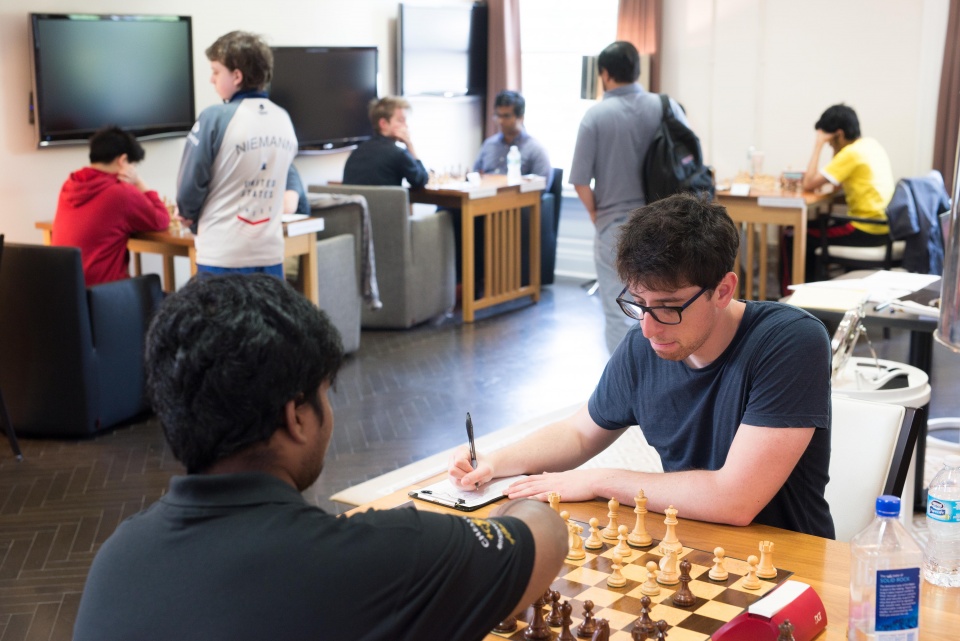 Kostya Kavutskiy, Photo Austin Fuller
Kostya Kavutskiy, Photo Austin Fuller All in all it’s a tremendous pleasure to play at the Saint Louis Chess Club, the playing conditions are truly superb and the tournaments are always organized and run with the utmost professionalism. Visit the official tournament page for the full standings, games, and photos from the invitational. The next major events taking place at the club will be the U.S. Junior Closed Championship, starting in a few weeks, as well as the Sinquefield Cup in August. FM Kostya Kavutskiy is a chess player, writer, and teacher based in Northern California. Make sure to follow Kostya on his Twitter and check out his regularly updates. GM Elshan Moradiabadi is a coach, writer, and commentator based in Texas. Elshan is a PhD candidate in Management information systems (MIS). Follow Elshan on his Twitter, and please feel free to contact him at Click here to show email address for consultation, coaching/lectures (online or on site), or writing cooperation. Next up at the Saint Louis Chess Club: The US Junior Closed Championships, set for July 7-18.
Categories
Archives
- January 2026 (8)
- December 2025 (27)
- November 2025 (29)
- October 2025 (39)
- September 2025 (27)
- August 2025 (29)
- July 2025 (43)
- June 2025 (25)
- May 2025 (24)
- April 2025 (29)
- March 2025 (29)
- February 2025 (20)
- January 2025 (24)
- December 2024 (34)
- November 2024 (18)
- October 2024 (35)
- September 2024 (23)
- August 2024 (27)
- July 2024 (44)
- June 2024 (27)
- May 2024 (31)
- April 2024 (51)
- March 2024 (34)
- February 2024 (25)
- January 2024 (26)
- December 2023 (29)
- November 2023 (26)
- October 2023 (37)
- September 2023 (27)
- August 2023 (37)
- July 2023 (47)
- June 2023 (33)
- May 2023 (37)
- April 2023 (45)
- March 2023 (37)
- February 2023 (28)
- January 2023 (31)
- December 2022 (23)
- November 2022 (32)
- October 2022 (31)
- September 2022 (19)
- August 2022 (39)
- July 2022 (32)
- June 2022 (35)
- May 2022 (21)
- April 2022 (31)
- March 2022 (33)
- February 2022 (21)
- January 2022 (27)
- December 2021 (36)
- November 2021 (34)
- October 2021 (25)
- September 2021 (25)
- August 2021 (41)
- July 2021 (36)
- June 2021 (29)
- May 2021 (29)
- April 2021 (31)
- March 2021 (33)
- February 2021 (28)
- January 2021 (29)
- December 2020 (38)
- November 2020 (40)
- October 2020 (41)
- September 2020 (35)
- August 2020 (38)
- July 2020 (36)
- June 2020 (46)
- May 2020 (42)
- April 2020 (37)
- March 2020 (60)
- February 2020 (38)
- January 2020 (45)
- December 2019 (34)
- November 2019 (35)
- October 2019 (42)
- September 2019 (45)
- August 2019 (56)
- July 2019 (44)
- June 2019 (35)
- May 2019 (40)
- April 2019 (48)
- March 2019 (61)
- February 2019 (39)
- January 2019 (30)
- December 2018 (29)
- November 2018 (51)
- October 2018 (45)
- September 2018 (29)
- August 2018 (49)
- July 2018 (35)
- June 2018 (31)
- May 2018 (39)
- April 2018 (31)
- March 2018 (26)
- February 2018 (33)
- January 2018 (30)
- December 2017 (26)
- November 2017 (24)
- October 2017 (30)
- September 2017 (30)
- August 2017 (31)
- July 2017 (28)
- June 2017 (32)
- May 2017 (26)
- April 2017 (37)
- March 2017 (28)
- February 2017 (30)
- January 2017 (27)
- December 2016 (29)
- November 2016 (24)
- October 2016 (32)
- September 2016 (31)
- August 2016 (27)
- July 2016 (24)
- June 2016 (26)
- May 2016 (19)
- April 2016 (30)
- March 2016 (36)
- February 2016 (28)
- January 2016 (32)
- December 2015 (26)
- November 2015 (23)
- October 2015 (16)
- September 2015 (28)
- August 2015 (28)
- July 2015 (6)
- June 2015 (1)
- May 2015 (2)
- April 2015 (1)
- February 2015 (3)
- January 2015 (1)
- December 2014 (1)
- July 2010 (1)
- October 1991 (1)
- August 1989 (1)
- January 1988 (1)
- December 1983 (1)







